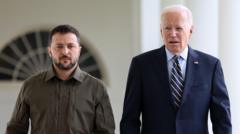The US government has officially announced the release of $20 billion in economic assistance to Ukraine, which will be funded through the seized assets of Russia. This allocation is part of a broader $50 billion commitment made by G7 nations in June, aiming to provide critical support to Ukraine as it confronts ongoing challenges in the conflict arising from Russia's invasion.
US Treasury Secretary Janet Yellen highlighted that utilizing frozen Russian funds ensures that Russia is held accountable for what she described as an "illegal war," thereby lessening the financial burden on American taxpayers. However, the announcement occurs at a pivotal moment, with US President Joe Biden set to be succeeded by Donald Trump, who has publicly expressed a desire to expedite an end to the war and has questioned the continued financial support for Ukraine.
The recent financial infusion comes as Ukrainian forces have faced setbacks, losing territory to advancing Russian forces in the eastern parts of the country. The funding was transferred to a World Bank fund, which restricts the use of the money for military purposes, emphasizing a focus on supporting essential services such as hospitals and emergency operations. Yellen noted that Ukraine needs these resources to sustain its defense against Russian military actions. The European Union has also committed to a similar initiative, pledging over €18 billion to Ukraine through the same mechanism of utilizing frozen assets.
Despite this significant support, there are uncertainties regarding the future of US financial aid given the political shifts anticipated with the incoming administration, which may impact ongoing military assistance and the broader international response to the crisis in Ukraine.
US Treasury Secretary Janet Yellen highlighted that utilizing frozen Russian funds ensures that Russia is held accountable for what she described as an "illegal war," thereby lessening the financial burden on American taxpayers. However, the announcement occurs at a pivotal moment, with US President Joe Biden set to be succeeded by Donald Trump, who has publicly expressed a desire to expedite an end to the war and has questioned the continued financial support for Ukraine.
The recent financial infusion comes as Ukrainian forces have faced setbacks, losing territory to advancing Russian forces in the eastern parts of the country. The funding was transferred to a World Bank fund, which restricts the use of the money for military purposes, emphasizing a focus on supporting essential services such as hospitals and emergency operations. Yellen noted that Ukraine needs these resources to sustain its defense against Russian military actions. The European Union has also committed to a similar initiative, pledging over €18 billion to Ukraine through the same mechanism of utilizing frozen assets.
Despite this significant support, there are uncertainties regarding the future of US financial aid given the political shifts anticipated with the incoming administration, which may impact ongoing military assistance and the broader international response to the crisis in Ukraine.





















